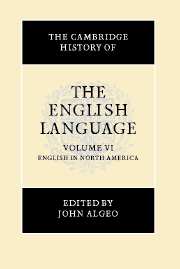Book contents
- Frontmatter
- 1 EXTERNAL HISTORY
- 2 BRITISH AND AMERICAN, CONTINUITY AND DIVERGENCE
- 3 BRITISH AND IRISH ANTECEDENTS
- 4 CONTACT WITH OTHER LANGUAGES
- 5 AMERICANISMS
- 6 SLANG
- 7 DIALECTS
- 8 AFRICAN-AMERICAN ENGLISH
- 9 GRAMMATICAL STRUCTURE
- 10 SPELLING
- 11 USAGE
- 12 CANADIAN ENGLISH
- 13 NEWFOUNDLAND ENGLISH
- 14 American English Abroad
- Glossary of Linguistic Terms
- Bibliography
- Index
- THE CAMBRIDGE HISTORY OF THE ENGLISH LANGUAGE
4 - CONTACT WITH OTHER LANGUAGES
Published online by Cambridge University Press: 28 March 2008
- Frontmatter
- 1 EXTERNAL HISTORY
- 2 BRITISH AND AMERICAN, CONTINUITY AND DIVERGENCE
- 3 BRITISH AND IRISH ANTECEDENTS
- 4 CONTACT WITH OTHER LANGUAGES
- 5 AMERICANISMS
- 6 SLANG
- 7 DIALECTS
- 8 AFRICAN-AMERICAN ENGLISH
- 9 GRAMMATICAL STRUCTURE
- 10 SPELLING
- 11 USAGE
- 12 CANADIAN ENGLISH
- 13 NEWFOUNDLAND ENGLISH
- 14 American English Abroad
- Glossary of Linguistic Terms
- Bibliography
- Index
- THE CAMBRIDGE HISTORY OF THE ENGLISH LANGUAGE
Summary
Pre-contact: languages before English in North America
English speakers were relatively late participants in the expansion of European colonialism. Long before English was much used outside the British Isles other European languages such as Portuguese, Spanish, and Dutch had reached around the world. The first signs of the global expansion that was to characterize the development of English in subsequent centuries and bring it into contact with many other languages appeared in the sixteenth century. Before that time English was little used abroad, and languages outside Europe had hardly any direct influence on it.
The waves of settlement and immigration that brought the first settlers to the North American continent covered an enormous time span and involved widely scattered settlements. Initially, there was little two-way contact between the first English settlers and the indigenous people in North America (R. Bailey 1991a, 62). English speakers had come explicitly as colonists, unlike the French, for instance, who came to trade. The English settlers lived in self-contained communities dependent on Britain for supplies until necessity drove them to seek help locally. The earliest words to make their way back to England came in travelers' reports and were more usually from European rather than indigenous languages. Even many of the indigenous words such as tobacco that eventually were to become part of international English came in via another European language first (§ 4.2.2.2).
- Type
- Chapter
- Information
- The Cambridge History of the English Language , pp. 154 - 183Publisher: Cambridge University PressPrint publication year: 2001
- 5
- Cited by

